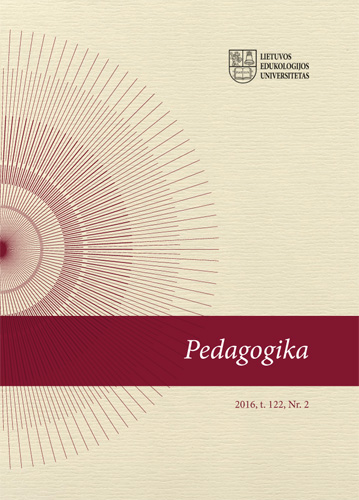Mokytojų ugdymas versus rengimas
Teacher Education Versus Teacher Training
Author(s): Elvyda MartišauskienėSubject(s): Education, Vocational Education, Sociology of Education
Published by: Vytauto Didžiojo Universitetas
Keywords: education; training; upbringing; teacher training; teacher education;
Summary/Abstract: The teacher occupies a special place in the history of any nation or the whole human kind because s/he educates and develops creators of the future. Therefore, it is necessary to understand fundamental concepts because their definition is a significant factor in the development of science and, to a big extent, predetermines the efficiency of problem solutions. This is particularly important for educational sciences, which imply human spiritual powers that exceed the cause effect relationship. The category of ugdymas (education) was introduced by S. Šalkauskis during the period of the Independent Lithuania, and its content compares to upbringing in its broad sense in other languages. Such approach is also supported by other scientists (Laužikas, Maceina), who expanded the concept of education: the borders of this complex phenomena were defined, the genesis that complies with the human nature was revealed, the functions of education, based on inborn powers,were highlighted, the most important features of education were singled out and interweaving of activities of the educator and the educatee was shown. Only during the last decade of the soviet occupation a return to the category of education was observed again, whereas its fundamental extension was ensured after the Restoration of Lithuania’s Independence, when its boundaries (complying with the paradigm of liberal education, which is grounded on the spiritual origin of a human being and provides sense to the upbringing function in a contemporary manner) were determined at all levels (those of educational policy, theory, methodology). Having adopted The Thesaurus for Education Systems in Europe, the problems emerged as the main functions of education were eliminated from the active usage despite their huge significance defining the place of the teacher in the process of education. Since ancient times the activities of the teacher have been identified with his/her upbringing powers, which link with the maturity of teacher’s personality, as the most important and authentic instrument of education. It directly influences (evokes, elevates and encourages) the spread of the educatee’s personality and simultaneously ensures highest achievements in his/her cognitive activities (knowledge, abilities, skills). Moreover, rapid development of technologies leads to an increasing importance of personal qualities of employees that enable the control and change oftheir own powers. The fact that the exceptionality of the teacher is predetermined by his or her spiritual values is not even questioned. Therefore, their spread should comprise the core of pedagogical studies, whereas the study process should become education, which empowers preparation to teach others.
Journal: Pedagogika
- Issue Year: 122/2016
- Issue No: 2
- Page Range: 17-32
- Page Count: 16
- Language: Lithuanian

